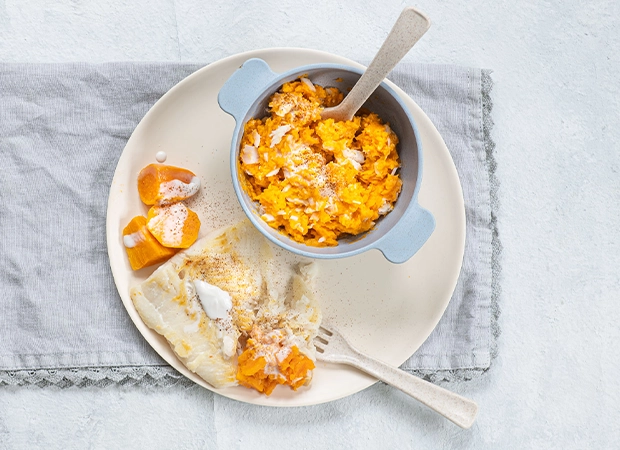Starting your baby on solid foods is an important milestone. Besides setting the stage for a healthy relationship with food as they grow up, introducing solid foods also gives your baby the added nutrients they need for their rapidly developing bodies and minds. Here are the nutrients and foods you’ll want to focus on as you go through your weaning journey.
Carbohydrates
In Weaning Sense, occupational therapist Meg Faure and paediatric dietitian Kath Megaw explain that your baby’s digestive system starts maturing from the third trimester of pregnancy – and is still maturing when they are born. Breast milk (or formula) is specifically designed to be easy for a still immature gut to process, but as the baby grows and develops, the gut needs to be exposed to whole foods to complete the maturation process. (By the time they turn two years old, your child’s gut will be similar to that of an adult’s.)
Fibre, a type of carbohydrate, is essential in helping the digestive system function – and the fibres found in vegetables are especially gentle enough for your baby’s developing gut.
Natural carbohydrates are also an essential source of glucose, which gives us energy. Avoid refined and processed sources of carbohydrates and choose foods with naturally occurring carbohydrates. These include:
- Nuts
- Seeds
- Avocado
- Dairy
- Vegetables
- Fruit
You may be concerned about introducing nuts to your baby, but as long as you do this safely, Meg and Kath recommend introducing nuts early on in your weaning journey. Rather than giving your baby whole nuts, which are a choking hazard, spread a thin layer of nut butter on bread or add it to cereal or a vegetable-based sauce for added flavour and nutrients. Note that if your baby is already showing signs of allergies, be sure to check with your healthcare professional before introducing an allergen.
MUST-TRY RECIPE: Sweet potato-and-chickpea fritters
Proteins are essential for growth and to boost the immune system. Again, while parents may feel hesitant to introduce protein-rich foods such as eggs or yoghurt because of concerns around allergies, Weaning Sense notes that research has shown that early introduction to allergens can actually reduce the risk of allergies developing. In addition, if you’re concerned that your baby is unable to chew meat, which is also one of the best sources of protein, be assured that your baby’s gums are far stronger than you might think! As long as the meat is properly prepared to prevent choking (choose minced meat or finely grind a chicken breast fillet, for example), eating meat is also a great way for your baby to practise their chewing skills.
MUST-TRY RECIPE: Chicken and pear
Omega 3, 6 and 9 fatty acids are essential for your baby’s developing brain and immune system. Healthy fats are also a good source of energy. Good sources of healthy fats include:
- Olive oil
- Avocado
- Nuts
- Seed oils
- Full-fat dairy products
- Meat and eggs
MUST-TRY RECIPE: Cheese omelette
For access to age-appropriate meal plans and recipes, be sure to download the Parent Sense app here.

